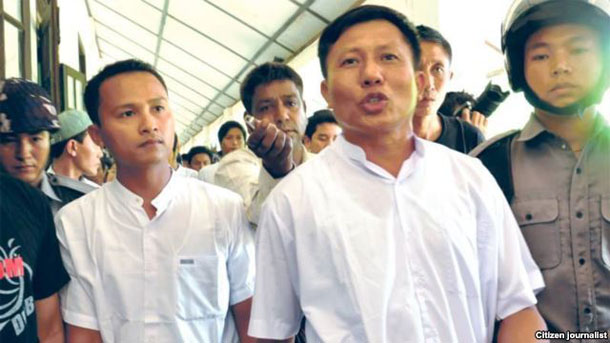RANGOON — Opposition leader Aung San Suu Kyi has condemned the 10-year prison sentences handed down to four local journalists and their boss on Thursday, saying the punishments were disproportionate and that she doubted the government’s commitment to media freedom.
Suu Kyi addressed a National League for Democracy (NLD) rally in Magwe Division’s Pakkoku town on Saturday as part of her nationwide constitutional reform campaign, when she was asked by journalists in the crowd what she thought of the verdict.
“In a journalist’s case, 10 years’ imprisonment is very excessive in my opinion. This will have to be reviewed by the judiciary,” the NLD chair said. “While there are claims of democratic reform [in Burma], this is questionable when the rights of journalists [to report] are being controlled.”
“The case is said to be concerned with national security. It’s not that I don’t accept a concern over national security, but in a democratic system, security should be in balance with freedom,” Suu Kyi said.
The rally was reportedly the largest constitutional reform rally held in Mandalay Division since Suu Kyi’s campaign began in May and many tens of thousands of people joined the event.
The NLD chair told the crowd that her party wants a free and fair referendum on reforms to the military-drafted 2008 Constitution, while she also reaffirmed that her party opposes a change to the proportional representation voting system that is being considered by Parliament.
On Thursday, a Pakokku Township Court sentenced Unity journal’s CEO, Tin Hsan, 52, and journalists Lu Maw Naing, 28, Sithu Soe, 22, The Yazar Oo, 28, and Aung Thura, 25, to 10 years’ imprisonment with hard labor for trespassing and violating the colonial-era State Secrets Act.
The five had been held since Jan. 25 after their newspaper published a report and photos of a Burma Army facility in Pakokku Township, which the journalists alleged was a chemical weapons factory being constructed with the help of Chinese engineers.
The President’s Office subsequently filed a lawsuit against the journalists and their CEO. Recently, Unity journal shut down because of financial problems.
The harsh sentences have drawn widespread condemnation, both locally and internationally, and campaigners have pointed out that they are contradictory to the recently passed Press Law, which rules out prison sentences for journalists found to have broken the law in their work.
Presidential spokesman Ye Htut defended the verdict in media interviews this weekend, telling 7 Days Daily News via email that “journalists should sympathize with national security issues that are important for a country.”
Ye Htut went on to state that the imprisoned journalists had been charged with trespassing because they supposedly snuck into a restricted area around the Pakokku military facility—a charge that the reporters have denied in court.
The spokesman said he believed the US government would hand down a similar punishment to journalists in these supposed circumstances. “Try going into an American weapons factory [in this way] and see what happens,” he added.
The US Embassy said on Friday, however, that it was concerned over the prison sentences and questioned the Burmese government’s commitment to upholding certain freedoms. “10 years hard labor for journalists sends a deeply troubling message on [Burma’s] commitment to freedom of press and expression,” it said on Twitter.
On Saturday, two dozen journalists were barred from covering an event at the Myanmar Peace Center, in which President Thein Sein was supposed to meet with celebrities, because they wore t-shirts on which were printed the words “Stop Killing Press.”
Local and international media and human rights groups issued statements of concern in recent days, labelling the prison terms as serious backsliding on media freedom in Burma. Since assuming office in 2011, Thein Sein’s nominally civilian government introduced sweeping political reforms, including lifting draconian restrictions on the media.
PEN Myanmar called for a revision of the Unity case verdict and said the journalists had only “attempted to fulfill the public’s right to know.”
The case, the media group said, “not only interferes with the free flow of news, it also directly threaten the right to freedom of expression and freedom to news reporting. It’s a strong reminder that such action can be taken in similar cases against journalists.”
The Myanmar Press Council said the Unity journal case, along with the recent detention of three editors of Bi-Mon Tae Nay Journal on charges of defamation, represented a serious setback for Burma’s media freedom.
“The Myanmar Press Council does not agree and rejects the investigating, arrest and imprisonment of editors and journalists from an official media group,” it said, adding that the council was the first body under the Press Law that should be contacted to mediate in any dispute related to media reports.
The recent cases against journalists, the council said, “are threatening democratic transition of the government and the media’s freedom of press.”
Amnesty International said on Friday that the Unity Journal verdict was “a very dark day for freedom of expression” in Burma, adding that it “considers all five men to be prisoners of conscience and calls for their immediate and unconditional release.”

















